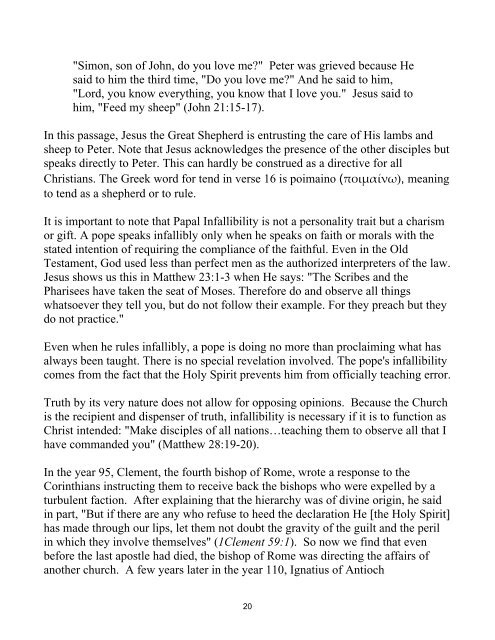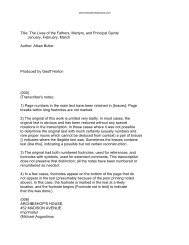Sebastian R. Fama - St. Patrick's Basilica
Sebastian R. Fama - St. Patrick's Basilica
Sebastian R. Fama - St. Patrick's Basilica
Create successful ePaper yourself
Turn your PDF publications into a flip-book with our unique Google optimized e-Paper software.
"Simon, son of John, do you love me?" Peter was grieved because He<br />
said to him the third time, "Do you love me?" And he said to him,<br />
"Lord, you know everything, you know that I love you." Jesus said to<br />
him, "Feed my sheep" (John 21:15-17).<br />
In this passage, Jesus the Great Shepherd is entrusting the care of His lambs and<br />
sheep to Peter. Note that Jesus acknowledges the presence of the other disciples but<br />
speaks directly to Peter. This can hardly be construed as a directive for all<br />
Christians. The Greek word for tend in verse 16 is poimaino (ποιμαίνω, meaning<br />
to tend as a shepherd or to rule.<br />
It is important to note that Papal Infallibility is not a personality trait but a charism<br />
or gift. A pope speaks infallibly only when he speaks on faith or morals with the<br />
stated intention of requiring the compliance of the faithful. Even in the Old<br />
Testament, God used less than perfect men as the authorized interpreters of the law.<br />
Jesus shows us this in Matthew 23:1-3 when He says: "The Scribes and the<br />
Pharisees have taken the seat of Moses. Therefore do and observe all things<br />
whatsoever they tell you, but do not follow their example. For they preach but they<br />
do not practice."<br />
Even when he rules infallibly, a pope is doing no more than proclaiming what has<br />
always been taught. There is no special revelation involved. The pope's infallibility<br />
comes from the fact that the Holy Spirit prevents him from officially teaching error.<br />
Truth by its very nature does not allow for opposing opinions. Because the Church<br />
is the recipient and dispenser of truth, infallibility is necessary if it is to function as<br />
Christ intended: "Make disciples of all nations…teaching them to observe all that I<br />
have commanded you" (Matthew 28:19-20).<br />
In the year 95, Clement, the fourth bishop of Rome, wrote a response to the<br />
Corinthians instructing them to receive back the bishops who were expelled by a<br />
turbulent faction. After explaining that the hierarchy was of divine origin, he said<br />
in part, "But if there are any who refuse to heed the declaration He [the Holy Spirit]<br />
has made through our lips, let them not doubt the gravity of the guilt and the peril<br />
in which they involve themselves" (1Clement 59:1). So now we find that even<br />
before the last apostle had died, the bishop of Rome was directing the affairs of<br />
another church. A few years later in the year 110, Ignatius of Antioch<br />
20






